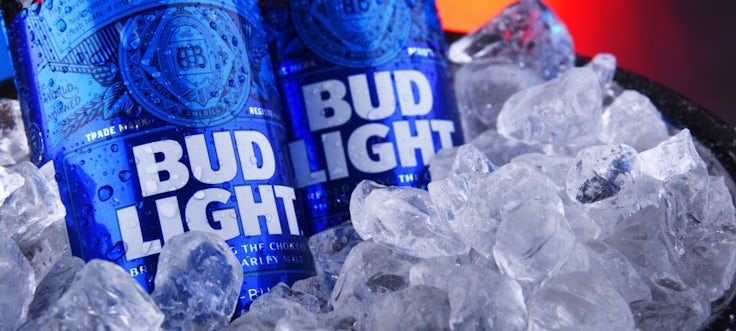AB InBev: Bud Light performance ‘constrained’ growth in 2023
AB InBev’s volume sales declined by 15.3% in North America in the final quarter of the year, this was primarily driven by Bud Light, over six months on from a boycott of the brand.

Falling volumes of Bud Light in the US has “constrained” AB InBev’s financial performance in the past year, as last year’s boycott continues to harm its bottom line.
AB InBev saw beer volumes decline 15.3% year-over-year in North America in the final quarter of 2023. The company said the volume decline was primarily due to Bud Light’s poor performance.
Bud Light has seen declining volumes in the US since April, after a brief social media partnership with transgender influencer Dylan Mulvaney prompted a boycott by some conservative consumers.
Since then AB InBev has attempted to distance itself from the incident, with CEO Michel Doukeris stressing that it was confined to “one post” and stating its consumers “want to enjoy their beer without the debate”.
It appears that AB InBev’s efforts to distance itself from the incident in the US have not been successful. Indeed, the volume decline reported in North America in the fourth quarter was actually steeper than the 14% decline seen in the second quarter, the period that occurred immediately after the backlash.
Bud Light’s ad backlash shows the complexity of mass marketing
Bud Light is AB InBev’s biggest brand in the US, a country which made up around one-sixth of its sales in 2022, and therefore, the impact of its falling volumes is felt across the company’s balance sheet.
“Our full growth potential was constrained by the performance of our US business,” Doukeris told investors today [29 February], as it reported its results for the 2023 financial year.
Across the entire year, revenues in the US declined by 9.5%, while volumes in North America declined by 12.1% year-over-year.
Despite the decline in the US, AB InBev did grow revenues by 7.8% to $59.38bn (£46.84bn) in the year, although this was mainly driven by pricing and premiumisation, as volumes shrunk 1.7%.
Doukeris admitted that the company had experienced a “challenging year” in the US, but commended how the business dealt with these obstacles. It “stepped up” its investment in its brands, with a particular focus on its “megabrands” and its “megaplatforms”.
AB InBev define its “megabrands” as its biggest brands which drive the majority of its growth. Its “megaplatforms” are areas like sport and music that “all consumers love”. It highlighted sponsorship work with music festivals and award shows, as well as sports teams, as examples of how it is focusing investment behind these platforms.
AB InBev CMO: Olympics partnership will ‘strengthen’ beer as a category
Last month, it announced that Corona Cero, the non-alcoholic version of one of its leading brands would become the first beer brand to become a worldwide sponsor of the Olympic Games.
Despite the challenges brought by the US and declining volumes overall for 2023, AB InBev is upbeat about overarching prospects for the beer industry, which Doukeris said is “big, profitable and growing”.
The company claims it is contributing to this category growth by introducing beer to new occasions and consumers. For example, its non-alcoholic portfolio continues to outperform its total business through brands like Corona Cero and Budweiser Zero.
The business also claimed its brand, pack and liquid innovation is driving beer consumption among female consumers.





